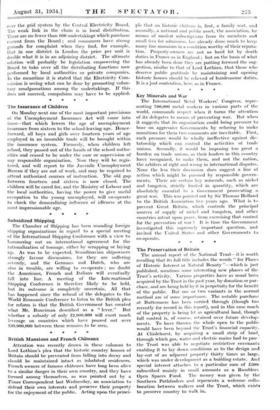Key Minerals and War The International Metal Workers' Congress, repre-
senting 700,000 metal workers in various parts of the world, commands respect when it turns the attention of its delegates to means of preventing war. But. when it suggests that its organization could bring pressure to bear on aggressive Governments by refusing to make munitions for them two comments are inevitable. First, such pressure would be wholly ineffective against dic- tatorship which can control the activities of trade unions. Secondly, it would be imposing too great a burden on trade unions, as their leaders in this country have recognized, to make them, and not the nation, the arbiters of right and wrong in international disputes. None the less their discussion does suggest a line of action which might be pursued by responsible govern. ments. There are certain key minerals, such as nickel and tungsten, strictly limited in quantity, which arc absolutely essential to a Government prosecuting a great war. This was pointed out by Sir Thomas Holland to the British Association five years ago. 'What is to prevent Great Britain, which controls the principal sources of supply of nickel and tungsten, and other countries intent upon peace, from exercising that control for the prevention of war ? It is time the Government investigated this supremely important question, and invited the United States and other Governments to co-operate.






































 Previous page
Previous page